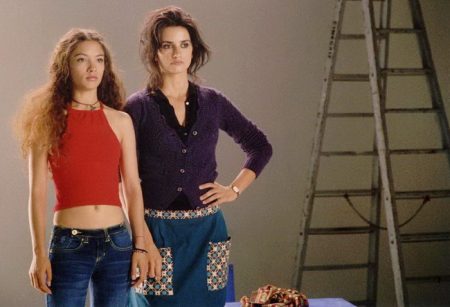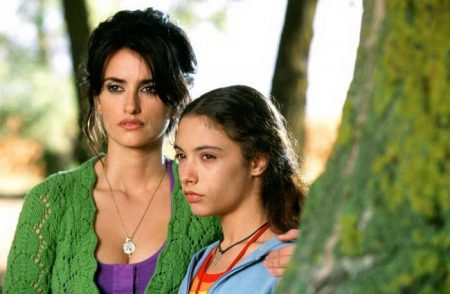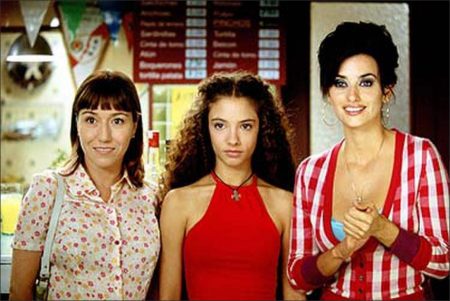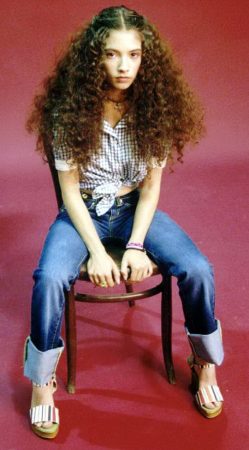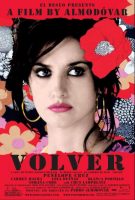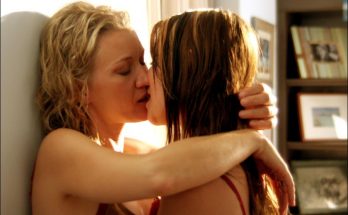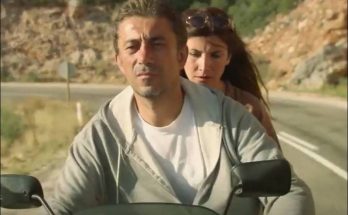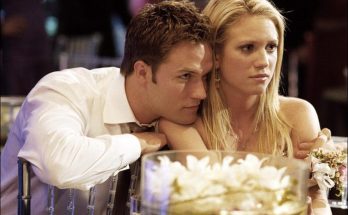Shooting
Volver Movie Trailer. “The most difficult thing about Volver has been writing its synopsis. My films are becoming more and more difficult to relate and summarize in a few lines. Fortunately, this difficulty has not been reflected in the work of the actors, or of the rest of the crew. The shooting of “Volver” went like clockwork.
I guess I enjoyed it more because the last shoot (Bad Education) was absolute hell. I had forgotten what it was like to shoot without constantly feeling as though I was on the edge of the abyss. This doesn’t mean that Volver is better than my last film (in fact, I’m very proud of having made Bad Education) just that this time, I suffered less. In fact, I didn’t suffer at all.
In any case, Bad Education confirmed something essential for me (which I had already discovered on Matador and Live Flesh): you can never throw in the towel. Even if you’re convinced that your work is a disaster, you have to keep fighting for every shot, every take, every look, every silence, every tear. You mustn’t lose a drop of enthusiasm even if you’re in despair. The passing of time gives you another perspective and sometimes, things weren’t as bad as you once thought.”
Confession
“Volver (meaning `coming back’) is a title that includes several kinds of `coming back’ for me. I have come back, a bit more, to comedy. I have come back to the world of women, to La Mancha (this is undoubtedly my most strictly Manchegan film, the language, the customs, the patios, the sobriety of the facades, the streets paved with cobblestones).
I am working again with Carmen Maura (after 17 years), with Penélope Cruz, Lola Dueñas and Chus Lampreave. I have come back to motherhood, as the origin of life and of fiction. And naturally, I have come back to my mother. To come back to La Mancha is to come back to the maternal bosom.
While writing the screenplay and during the shoot, my mother was always present and very close. I don’t know if the film is good (it’s not for me to say), but I’m sure that it did me a lot of good to make it.
I have the impression, and I hope it’s not a fleeting feeling, that I have managed to slot in a piece of the puzzle (the misalignment of which has caused me a lot of pain and anxiety throughout my life, I would even say that in recent years it had damaged my existence, and taken on far too great a significance).
The piece of the puzzle that I am talking about is “death”, not just my own and that of my loved ones but the merciless disappearance of everything that lives. I have never accepted or understood it. And that puts you in a distressing situation when faced with the increasingly rapid passage of time.
The most important thing that comes back in Volver is the ghost of a mother who appears to her daughters. In my village those things happen (I grew up hearing stories of apparitions), yet I don’t believe in apparitions. Only when they happen to others, or when they happen in fiction. And this fiction, the one in my film (and here comes my confession) has produced a serenity in me the likes of which I haven’t felt for a long time (really, serenity is a word whose meaning is a mystery to me).
I have never in my life been a serene person (and it’s never mattered to me in the slightest). My innate restlessness, along with a galloping dissatisfaction, has generally acted as a stimulus. It’s only in recent years that my life has gradually deteriorated, consumed by a terrible anxiety. And that wasn’t good either for living or for working. In order to direct a film, it’s more important to have patience than to have talent. And I had lost all patience a long time ago, particularly with trivial things which are what require most patience. This doesn’t mean that I have become less of a perfectionist or more complacent, not at all. But I believe that with Volver I have recovered some of my “patience”, a word which naturally involves many other things.
I have the impression that, through this film, I have gone through a necessary period of mourning, a painless mourning (like that of the character of Agustina the neighbour). I have filled a vacuum, I have said goodbye to something (my youth?) I hadn’t yet said goodbye to and needed to, I don’t know. There is nothing paranormal in all this. My mother hasn’t appeared to me, although, as I said, I felt her presence closer than ever.
Volver is a tribute to the social rituals practiced by the people of my village with regard to death and the dead. The dead never die. I have always admired and envied the naturalness with which my neighbours speak of the dead, cultivate their memory and tend their graves constantly. Like the character of Agustina in the film, many of them look after their own graves for years, while they are alive. I have the optimistic feeling that I have been impregnated with all that and that some of it has stayed with me.
I never accepted death, I’ve never understood it (I’ve said that already). For the first time, I think I can look at it without fear, although I continue to neither understand nor accept it. I’m starting to get the idea that it exists.
Despite being a non-believer, I’ve tried to bring the character (of Carmen Maura) from the other world. And I’ve made her talk about heaven, hell and purgatory. And, I’m not the first one to discover this, the other world is here. The other world is this one. Hell, Heaven, Purgatory, they are us, they are inside us – Sartre put it better than I.”
The River
“The happiest memories of my childhood are related to the river. My mother used to take me with her when she went to wash clothes there because I was very little and she had no one with whom to leave me. There were always several women washing clothes and spreading them out on the grass. I would sit near my mother and put my hand in the water, trying to stroke the fish that answered the call of the fortuitously ecological soap the women used back then and which they made themselves.
The river, the rivers, they were always a celebration. It was also in the waters of a river where, a few years later, I discovered sensuality. Undoubtedly the river is what I miss most from my childhood and puberty. The women would sing while they were washing. I’ve always liked female choirs. My mother used to sing a song about some gleaners who would greet the dawn working in the fields and singing like joyful little birds. I sang the fragments that I remembered to the composer on Volver, my faithful Alberto Iglesias, and he told me it was a song from the operetta “La rosa del azafrán”. In my ignorance, I would never have thought that that heavenly music was an operetta. That is how the theme has become the music that accompanies the opening credits.
In Volver, Raimunda is looking for a place to bury her husband and she decides to do it on the banks of the river where they met as children. The river, like the graphics of any transport system, like tunnels or endless passageways, is one of many metaphors for time.”
Genre and Tone
“I suppose that Volver is a dramatic comedy. It has funny sequences and dramatic sequences. Its tone imitates “real life” but it isn’t a portrayal of local customs. Rather it has a surreal naturalism, if that were possible. I’ve always mixed genres and I still do. For me, it comes naturally.
The fact of including a ghost in the plot is a basically comic element, particularly if you treat it in a realistic way. All of Sole’s attempts to hide the ghost from her sister, or the way she introduces her to her clients, give rise to very comic scenes.
Although what happens in Raimunda’s house (the death of the husband) is terrible, the way she struggles to keep anyone from finding out and the way she tries to get rid of him also create comic situations.
Mixing genres comes naturally to me but that doesn’t mean it’s free of risk (the grotesque and the grand guignol are always a threat). When you move between genres and go from one tone to its opposite in a matter of seconds, the best thing is to adopt a naturalistic style that manages to make the most ludicrous situation plausible. The only weapon you have, apart from a realistic setting, are the actors – the actresses, in this case. Luckily for me, they all exist in a constant state of grace. And they really put on a show in Volver.
Family
“Volver is a film about family, made with family. My own sisters were the advisers on what happened both in La Mancha and inside the houses in Madrid (the hair salon, the meals, cleaning materials, etc.) Although they were luckier, my family, like that of Sole and Raimunda, is a migrant family which came from a village to the big city in search of prosperity. Fortunately my sisters have continued to cultivate the culture of our childhood and have kept our mother’s heritage intact. I moved away from home very young and became an inveterate urbanite. When I return to the habits and customs of La Mancha, they are my guides.
The family in Volver is a family of women. The grandmother who has come back is Carmen Maura, her two daughters are Lola Dueñas and Penélope Cruz. Yohana Cobo is the granddaughter and Chus Lampreave is Aunt Paula, who still lives in the village. This group would have to include Agustina, the village neighbour (Blanca Portillo), the one who knows many of the family’s secrets, the one who has heard so many things, the one who, as soon as she gets up, taps on Aunt Paula’s window and doesn’t let up until the old lady answers, the one who brings her a loaf of bread every day, the one who finds her dead and calls Sole in Madrid. The one who opens her home to the corpse in order to give it a proper wake until the nieces arrive. The one who converts her mourning for the neighbour into mourning for her own mother, who disappeared years before, she doesn’t know where. The character of Agustina is, in her own right, part of the family that is headed by Carmen Maura.
Agustina represents a very important element in this female universe: the solidarity of neighbourhood women. The women in the village spread out problems, they share them. And they manage to make life much more bearable. The opposite also happens (the neighbour who hates the neighbour and this hatred is passed on from generation to generation until one day a tragedy explodes and even they don’t know why). I have only paid attention to the positive part of that Deep Spain, which is what I experienced as a child. In fact, Volver pays tribute to the supportive neighbour, that unmarried or widowed woman who lives alone and makes the life of the old lady next door her own life. For a great part of her final years, my mother was helped by her closest neighbours.
Those women were the inspiration for Agustina, a magnificent creation thanks to Blanca Portillo. For me she is the real revelation because I didn’t know her. I had only seen her in a play and I liked her but I couldn’t imagine that, with barely any film experience, she would be such a precise, polished actress, so overwhelming in her self-containment. Agustina, alone in the empty street, watching as Sole’s car disappears, is the image of rural solitude, stripped of all adornment. Blanca absorbed the essence of all the good neighbours in my village and made it her own.
Volver (2006)
Directed by: Pedro Almodóvar
Starring: Penélope Cruz, Carmen Maura, Yohana Cobo, Lola Dueñas, Blanca Portillo, Chus Lampreave, Antonio de la Torre, María Isabel Díaz, Yolanda Ramos, Elvira Cuadrupani, María Alfonsa Rosso
Screenplay by: Pedro Almodóvar
Production Design by: Salvador Parra
Cinematography by: José Luis Alcaine
Film Editing by: José Salcedo
Costume Design by: Bina Daigeler
Set Decoration by: Mara Matey
Music by: Alberto Iglesias
MPAA Rating: R for some sexual content and language.
Distributed by: Sony Pictures Classics
Release Date: November 3, 2006
Views: 149
